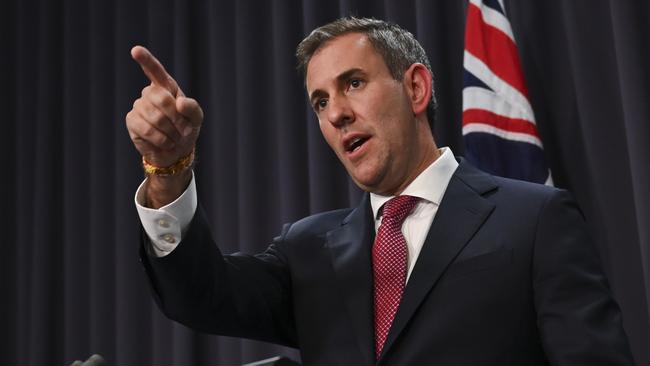Consumer groups warn against lowering bar for super funds to underperform in net zero push
The government should not give super funds a free pass to underperform in order to incentivise investments aligned with its energy transition goals.
Consumer groups have warned against giving super funds a free pass to underperform, potentially risking members’ retirement savings returns, in order to incentivise investments aligned with the government’s energy transition goals.
The calls come after the Albanese government on Tuesday said it was planning to make changes to the annual super performance tests after Australia’s largest industry funds said the tests discouraged investment in “the net-zero transformation” and other “asset classes that can strengthen the economy”.
“The bar shouldn’t be lowered,” said Gerard Brody, a director of Super Consumers Australia, a consumer advocate group.
“If there are tweaks that need to happen to the test, the outcome should still be an objective performance benchmark, and that there are consequences for not meeting them.”
The Your Future, Your Super tests assess the long-term performance of super products against tailored benchmarks, and were introduced by the Coalition government in 2021 to weed out underperforming funds.
The moves to change the tests comes as the government tries to encourage the $3.5tn super industry to invest in key areas of national priority, such as the net-zero transition, housing and defence.
“Why is it the job of super funds to rescue the energy transition?” asked Alex Dunnin, director of research and compliance at Rainmaker Information. “Their job is making money for fund members. That’s the law.”
In July last year, the Albanese government already reviewed whether the test had any unintended consequences or “perverse” outcomes for members, and in April introduced changes to the benchmarks that it said addressed concerns that they “unintentionally discouraged” investment in certain assets.
It also expanded the test to cover choice products.

But industry super funds have continued to voice concerns about the test discouraging investments in green, housing or other asset classes that are priority areas for the government, for fear of failing the YFYS assessment.
“Obviously, the priorities for the economy have changed compared to 12 months ago … but coming up with one simple test that’s going to solve for all these variables seems increasingly unlikely to be able to be done,” Kirby Rappell, executive director of SuperRatings, said.
“Super is a long-term investment and the performance test needs to be aligned with the long term. Priorities will shift and morph over time, but finding a test that does the whole lot is increasingly difficult if super has a range of things that it is trying to solve for.
“We are always concerned that any changes don’t lower the bar away from optimising retirement incomes.”
The government on Tuesday said it would release a consultation paper with potential changes to the test so that it doesn’t hold back “investment in economic priorities such as the net-zero transformation and housing” in coming months.
Funds that fail the super test must tell members in writing, and are named and shamed by the regulator, while a fund that fails two consecutive years cannot accept new members. According to APRA, 17 underperforming MySuper products have exited the market as a result of the test, including 9 that have failed the test.
That represents about 1.4 million members having $75bn of their assets moved to better-performing funds. The test has also played a key role in helping lower fees for members.
“Research that we’ve done that applied to MySuper funds found that it was effective in reducing the fees paid by members by about 20 per cent,” Mr Brody said. “We recognise that these things need to be reviewed and updated over time and it was always designed to deal with the really underperforming funds. So once those funds are dealt with, we’ll have to review it to ensure it’s maintaining or promoting performance, not just dealing with underperformance.
“I hope the review gives us that opportunity to ensure the tests promote performance and that there aren’t any unintended consequences.”
In 2023, only one MySuper product failed the test, but close to 12 per cent of 805 trustee directed super products failed it, with the majority issued by just four funds.






To join the conversation, please log in. Don't have an account? Register
Join the conversation, you are commenting as Logout